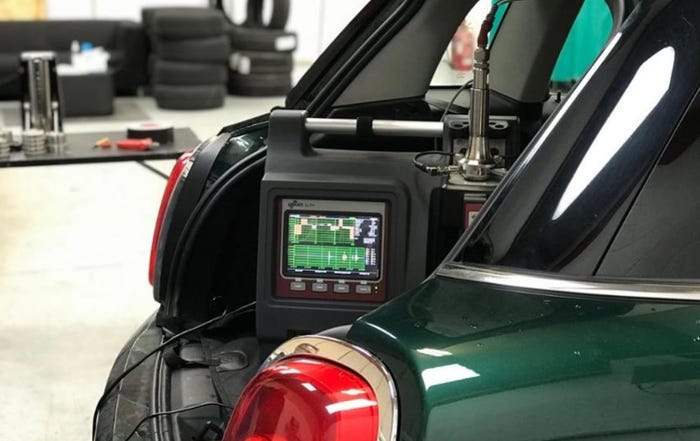Audi Postpones Diesel Q7 Launch; Revamping Dealer Network
Audi is on track to set a new sales record in the U.S. this year of 95,000 units. Through August, the auto maker’s deliveries were up 10.8% over year-ago.
September 21, 2007


NEW YORK – Audi of America Inc. will postpone the introduction of its diesel-powered Q7 cross/utility vehicle until early 2009, Executive Vice President Johan de Nysschen says during a media briefing here.
“We felt we could get the diesel message out better if we delayed the introduction for two months,” he says. “We will use the Detroit (North American International Auto Show) as a major (stage) for the new diesel.”
Delaying the diesel allows Audi to introduce the vehicle as a ’10 model, rather than an ’09, and therefore optimize model-year residuals, de Nysschen says.
“Diesel volume could be 15% of our model mix within a 5-year period after the Q7 launch,” he says, adding Audi anticipates 5%-10% of Q7 purchasers will choose the diesel option in the model’s first year.
Meanwhile, Audi is on track to set a new sales record in the U.S. this year of 95,000 units. Through August, the auto maker’s deliveries were up 10.8% over year-ago.
The biggest gains have been in Miami (74.7%), Phoenix (18.6%) and New York (13.9%). Overall, the northeast region is Audi’s retail volume leader, with year-to-date sales of 14,798 units, or about 25% of Audi’s total U.S. sales.
Audi has been able to grow sales despite the overall luxury-vehicle segment becoming stagnant.
“The only growth is in compact SUVs,” de Nysschen says. “We’re well positioned to capitalize (on that segment) with the Q5,” a smaller version of the Q7.

Audi expects 5%-10% of Q7 purchasers will choose diesel option in first year.
Such growth has been achieved with lower incentives than those offered by the brand’s German luxury-car competitors, he says, noting Audi’s incentives are running less than $3,000 per vehicle. That is considerably less than spiffs offered by BMW AG and Mercedes-Benz. Audi’s incentives only are available through lease deals.
De Nysschen says Audi sales will grow to 130,000-140,000 units annually by 2012. Audi AG executives at the recent Frankfurt auto show said they were targeting deliveries of 200,000 units per year by 2015.
Audi is revamping its dealer network in the U.S. to prepare for higher sales volumes.
The auto maker’s 270 dealers now will be required to make considerable investments to meet new volume, customer-service satisfaction and increased used-car business requirements. With the new guidelines, however, Audi is offering the opportunity to make considerably higher margins per unit.
Dealers currently make a base margin of 7%, de Nysschen says, but they could gain up to 10% more, including an additional $600-$800 per unit on used cars, if they meet Audi’s targets for leased-vehicle repurchasing.
“We have indicated to dealers what areas Audi is unhappy about,” de Nysschen says. “We give them 180 days to remedy (the deficiencies).”
Dealers who fail to make the improvements, or those who do not wish to make the investment, have the opportunity to sell their franchises back to Audi. A few such deals already have taken place, de Nysschen says, and Audi currently is in repurchase negotiations with five or six dealers.
Audi says it is committed to improving residuals and expects its pre-owned vehicle program to help accomplish this. The auto maker has established 11 reconditioning centers to renew used vehicles before they go to auction. To qualify for the program, used Audis must pass a 117-point checklist.
Audi plans to add 10 dealerships this year, de Nysschen says, noting he’d like to see as many as 15 new sales points by 2012.
“We’re not going to embark on an aggressive dealer network growth,” he says.
Some areas are less feasible candidates for expansion due to high real-estate costs, but he says there is a compelling case to open “lighthouse” stores in such places as Los Angeles and Manhattan to build brand awareness. To be viable, these dealerships would need to sell more than 1,000 units annually, de Nysschen says.
About 63% of the auto maker’s current dealer body are exclusive Audi dealers. The auto maker would like to see 150 exclusives stores by 2012.
The weak dollar is cutting into margins for the A3, Audi’s lowest-priced car, de Nysschen admits. But he insists the A3 is making a small profit here, mainly because Audi does not offer lease deals on the vehicle.
De Nysschen promises the next-generation A3 will be more differentiated from the Volkswagen AG architecture it now uses.
Meanwhile, Audi’s involvement in racing, particularly the American Le Mans Series, is an important part of Audi’s long-term marketing efforts, he says.
“Racing positions our brand with consumers that Audi stands for performance. We’re building on our (performance) legacy,” de Nysschen says, noting Audi’s ALMS success is being achieved with an advanced diesel engine.
Read more about:
2007About the Author
You May Also Like



